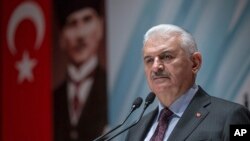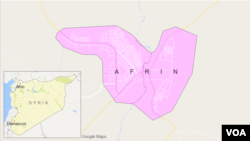Turkish officials say they are dissatisfied with assurances from Washington about a Kurdish border force the U.S. plans to maintain in northern Syria to help stabilize territory recently captured from the Islamic State terror group.
Speaking in Ankara Thursday, the country’s foreign minister, Mevlut Cavusoglu, warned the establishment such a force would cause “irreversible damage” to American-Turkish relations.
And in what some analysts see as an underscoring of the warning, the Turkish defense department announced that Turkey’s army and intelligence chiefs had flown to Moscow for talks.
Washington has said it plans to train a 30,000-member border force composed mainly of fighters drawn from the Kurdish People's Protection Units (YPG) to combat remaining jihadist factions in northern Syria and to ensure IS is unable to engineer a comeback.
The Turkish government sees the YPG as an offshoot of a Kurdish separatist group in Turkey, the outlawed Kurdistan Workers' Party (PKK), which Ankara has been battling since 1984.
On Sunday, Turkish President Recep Tayyip Erdogan denounced the planned U.S.-backed border force, dubbing it an “army of terror.”
The Pentagon qualified Wednesday what the planned force’s role would be and dismissed its description as an “army,” and
Secretary of State Rex Tillerson told reporters on a flight home from a conference in Vancouver, Canada, later Wednesday that the issue had beemn "misportrayed and misdescribed."
"We are not creating a border security force at all,” said Tillerson, who said he had discussed the issue with Cavusoglu at the Vancouver conference on North Korea. “I think it’s unfortunate that comments made by some left that impression. That is not what we’re doing.”
Nevertheless, Cavusoglu said Thursday his government still has doubts.
“Did this satisfy us in full? No, it did not,” he told CNN-Turk television in an interview. “The establishment of a so-called terror army would cause irreversible damage in our relations ...it is a very serious situation,” he warned.
Tensions over Syria’s Kurds have tested relations between the U.S. and Turkey for the past three years almost to breaking point. Ankara has been enraged by Washington’s alliance with the YPG, which led the battle to oust IS from Raqqa, the terror group’s self-proclaimed capital, and a swathe of territory across northern Syria.
Erdogan and his ministers have repeatedly called on the Trump administration to stop arms resupplies to the Syria Kurds, and they dismiss as “unworkable” U.S. promises to reclaim American-supplied weapons later from the YPG. They accuse the YPG of sharing the weapons with the PKK.
Earlier Wednesday in California, Tillerson explained why the U.S. intends to prolong its military presence in Syria to prevent the return of IS and to back up a United Nations-backed political process that Western powers hope will eventually see Syrian President Bashar al-Assad relinquish power.
“It is vital for the United States to remain engaged in Syria,” he said in a speech to a U.S. research organization audience. He said continued U.S. involvement would be necessary to help stabilize northern Syria, allowing refugees to return and to ensure IS and al-Qaida do not resurface as threats in Syria.
U.S. engagement would also help to diminish Iranian influence in Syria, he said.
But some analysts warn U.S. plans are insufficient to fulfill the aims outlined by Tillerson. According to Charles Lister, a Syria expert at the Middle East Institute, a Washington-based policy research organization, there hasn’t been any indication that “we’d be willing to do what it would actually take to achieve the substantial goals we’ve set for ourselves.”
The strategy to “transform the YPG-led Syrian Democratic Forces into a border security force has inevitably met with hostile responses in Ankara. An actor designated as a terrorist organization and perceived by Turkey as an existential security threat was never going to prove an acceptable ‘border security force,’” he says.
Turkey's National Security Council has warned it will take “any steps necessary immediately” to “defeat threats” on its border — signaling that Ankara is increasingly likely to offset the YPG’s alliance with the U.S. by moving militarily against Afrin, a Syrian Kurdish enclave west of the Euphrates River, preventing the Kurds from linking up cantons along the border with Turkey.
Earlier this week, President Erdogan warned an operation against the Kurdish-held enclave was imminent and state-run Turkish television channels have been broadcasting pictures on the Syrian border showing a build-up of troops, tanks and armored vehicles.
There have been reports of increased Turkish shelling of Afrin.
“Ankara and Washington seem to be competing to have the most unrealistic long-term Syria strategy: Attack the YPG and hope it goes away vs. support the YPG and hope the regime goes away,” tweeted Nicholas Danforth, a national security analyst with the Bipartisan Policy Center, a U.S.-based research group.
YPG leaders fear the future of Afrin may be part of a deal being negotiated between Russia and Turkey that would see Turkey accept the current Russian-backed Syrian government offensive on the northwest province of Idlib, the last remaining rebel-held province in Syria, in exchange for Russian acceptance of a Turkish move on Afrin.
YPG spokesperson Nouri Mahmoud said Thursday that the Turkish army threat to Afrin is “proof of a deal to exchange Idlib for Afrin.”
The area likely to be invaded by Turkish forces lies between Afrin and Manbij, a town Turkey already controls following an incursion the Turks launched into Syria in mid-2016. It remains unclear whether Turkish forces would try to seize the town of Afrin itself — an assault that would be challenging and result in high civilian casualties, warn analysts, or be content with controlling all roads in and out.
Cavusoglu acknowledged on Turkish television Thursday that despite disagreements between Ankara and Moscow over Syria — including on the future of Russia’s ally President Bashar al-Assad – Turkey and Russia “have coordinated and are coordinating many steps.” He added, “What we need to coordinate is the situation of their observers (on the ground) there to avoid an accident.”





